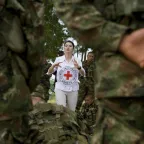Second Conference of States Parties to the Arms Trade Treaty
… and of human rights law, including acts of terrorism and sexual and gender-based violence. …
… and of human rights law, including acts of terrorism and sexual and gender-based violence. …
Since the Burundi crisis began in 2015, more than 250,000 people have fled to the neighbouring countries of Rwanda, Tanzania, Democratic Republic of the Congo and Uganda. Many families were split up …

… in particular the threat posed by acts of terrorism. International Humanitarian Law does not define terrorism, but expressly prohibits ‘acts of terrorism’, whichever party to a conflict …

… Armed Services Committee: Subcommittee on Terrorism, Unconventional Threats and …

Speech given by Peter Maurer, p resident of the International Committee of the Red Cross, at a Novartis lecture in Basel, Switzerland. A World in disarray: Conflict and migration from a humanitarian …
Speech given by Mr Peter Maurer, President of the International Committee of the Red Cross, at the 19th Annual Asian Investment Conference in Hong Kong. Excellencies, distinguished Guests, ladies and …
… that the law does not apply to counter terrorism operations; And overall, the sense … role to play in the quest to reduce acts of terrorism and other forms of extreme violence. …
… succession, international criminal justice, terrorism and international humanitarian law. …

… on the labelling of certain conflicts as ‘terrorism’ or ‘counter-terrorism’ operations, is seen by participants … are witnessing a trend of counter-terrorism (and other) legislation that …

An overview of the ICRC's large health programmes in Somalia and examples of the help we were able to provide to nearly half a million people in 2015. NEWSLETTER gargaar ICRC Somalia delegation …

Try one of the following resources:
Created in 1863, the ICRC library, alongside the ICRC archives, provides an indispensable documentary reference on the organization itself and international humanitarian law.
International humanitarian law is based on a number of treaties, in particular the Geneva Conventions of 1949 and their Additional Protocols, and a series of other instruments.
Customary international humanitarian law consists of rules that come from "a general practice accepted as law" and that exist independent of treaty law.